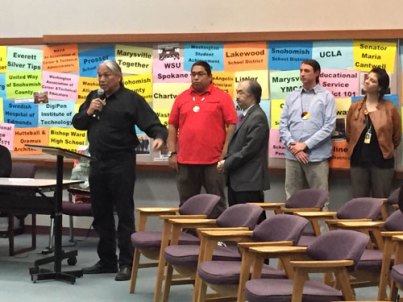A state law requires schools in Washington to teach students the history of the state’s 29 federally recognized indigenous nations, just as they teach U.S. and state history.
School districts that have adopted the “Since Time Immemorial” curriculum, which was formerly “encouraged” but is now mandatory, say the curriculum is an easy tool to use. But the curriculum encourages participation with local Native nations. “Our goal is to teach WITH tribes, rather than about them,” the curriculum states—and one of the challenges school districts report is developing the partnerships to make that happen.
RELATED: From ‘Encouraged’ to Mandatory’: Schools Must Teach Native History in Washington
Training now underway is helping to build those associations.
“Our [curriculum] trainings have doubled in both size and frequency” since the law made implementation of the curriculum mandatory, Michael Vendiola texted on July 27 from a conference in Omak on the Colville reservation. Vendiola, Swinomish, is program supervisor for the state education department’s Office of Native Education. “We are training more dynamically as well. For example, we are training more curriculum teams, administrators, and education associations.”
The training is getting a boost from Western Washington University’s Woodring College of Education, which received two grants totaling $600,000 from the Washington Student Achievement Council, a cabinet-level state agency.
“These two grants not only advance our professional development work in schools but, most significantly, forge important new efforts with Native American communities in our region,” Woodring College of Education Dean Francisco Rios said in an announcement of the grant. “It capitalizes on the strengths of our faculty while also honoring the important cultural knowledge of local indigenous communities.”
Of the funding, $400,000 is being invested in “Implementation of Since Time Immemorial: Higher Education and K-12 School Partnership Pilot Project,” a collaboration of Woodring College, The University of Washington, Western Washington University, and the state Office of Native Education.
The project will assist schools and districts that have a high number of Native American students, including Chief Kitsap Academy, which is owned and operated by the Suquamish Tribe and serves Native and non-Native students; Lummi Nation School; Marysville School District, which serves students from the Tulalip Tribes; Muckleshoot Tribal School; Shelton School District, which serves students from Skokomish and Squaxin; Taholah School District, which serves students from the Quinault Nation; and Wellpinit School District, which serves students from the Spokane Tribe.
State Sen. John McCoy, D-Tulalip, who authored the curriculum law, said it’s important that Native nations be involved because the curriculum is “only a baseline curriculum.” The curriculum includes such topics as “Exploring Washington State —Tribal Homelands,” “Washington Territory and Treaty Making,” “Being Citizens in Washington: The Boldt Decision,” and “Encounter, Colonization and Devastation.” But those courses are not localized; the involvement of local indigenous nations can help students understand those subjects on the local level.
The project is providing training workshops, professional development and coaching to teachers, administrators and paraprofessionals.
“Our entire team of diverse partners is dedicated to providing professional development that teaches regional tribal government, culture and history through the STI curriculum,” said Kristen French, associate professor of elementary education at Western Washington University.
“We are thrilled to have this grant because we can contribute and build on the good work that [the state Office of Native Education] and state Sen. John McCoy have done to improve Indian education,” she said, adding that six of seven team members are Native women trained in education.
Vendiola’s wife, Michelle, is “Since Time Immemorial” grant coordinator at Woodring College.
“With an emphasis on culture and identity, we expect this work to have long-term impact on the academic achievement of Native students, as well as all Washington state students,” she said in the grant announcement. “Ultimately, we are honored to participate in the improvement of future relationships between tribal communities and mainstream Washington state citizens.”
An example of how the involvement of local Native nations can bolster knowledge of Native culture and the environment Native and non-Native students share is “Science and the Swinomish,” a collaboration of Western Washington University, the Shannon Point Marine Center and the Swinomish Tribe.
The project received $200,000 in funding to train teachers and administrators in the La Conner and Concrete school districts, two districts serving Swinomish students.
The partnership will “personalize the STI curriculum and develop hands-on science lessons focused on the restoration and care of the environment essential to maintaining the traditional Swinomish way of living,” said Tim Bruce, an instructor at Woodring College.
Teachers and principals will receive training in the basics of the curriculum and then will dig deeper into the aspects that relate to science, focusing on locally relevant, culturally important topics such as salmon recovery, tideland impacts and water use—topics that affect everyone.
Organizers say teachers and principals will have a strong working knowledge of the curriculum by spring 2017, and will have multiple lesson plans ready for submission to a digital library where they can be shared with a wider audience.
Vendiola said feedback received from curriculum partners is helping educators innovate the curriculum in new ways.
A pre-K/early learning curriculum, titled “STI Tribal Sovereignty Early Learning Curriculum,” is a partnership of Thrive Washington—First Peoples, First Steps Alliance, and the Puget Sound ESD Native American Early Learning Project. “There are currently three pilot lessons availablefor the early learning community,” he said.
Giving Balance to History Instruction
Thirty percent of school districts in Washington are using “Since Time Immemorial,” which was developed by the state in consultation with indigenous nations in Washington.
The legislation that established STI seeks to give balance to history instruction, which has often ignored the state’s indigenous history. It also seeks to improve student knowledge of indigenous history and culture; foster cross-cultural respect and understanding; and bolster cultural sensitivity in all students.
“We do have a rich, solid history in the state, and it should be taught,” McCoy said in an earlier interview. Doing so would help students understand sovereignty and the work that indigenous nations do in their historical territories—authority that many elected officials don’t understand, McCoy said.
In addition to the above projects, regional training will be hosted in October by the Toppenish School District, on the Yakama Nation reservation; Education Service District 113, in the state capital of Olympia; the Port Gamble S’Klallam Tribe, whose students attend schools in the North Kitsap School District; and the Lummi Nation, whose students attend Lummi schools or schools in the Ferndale School District.
Read more at http://indiancountrytodaymedianetwork.com/2016/08/03/time-immemorial-training-gets-600k-boost-165325




